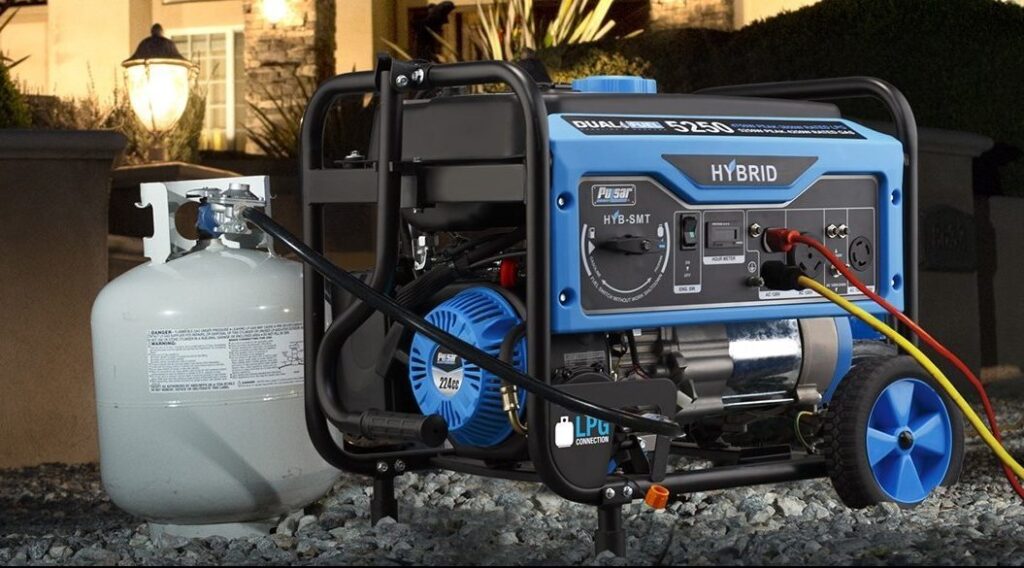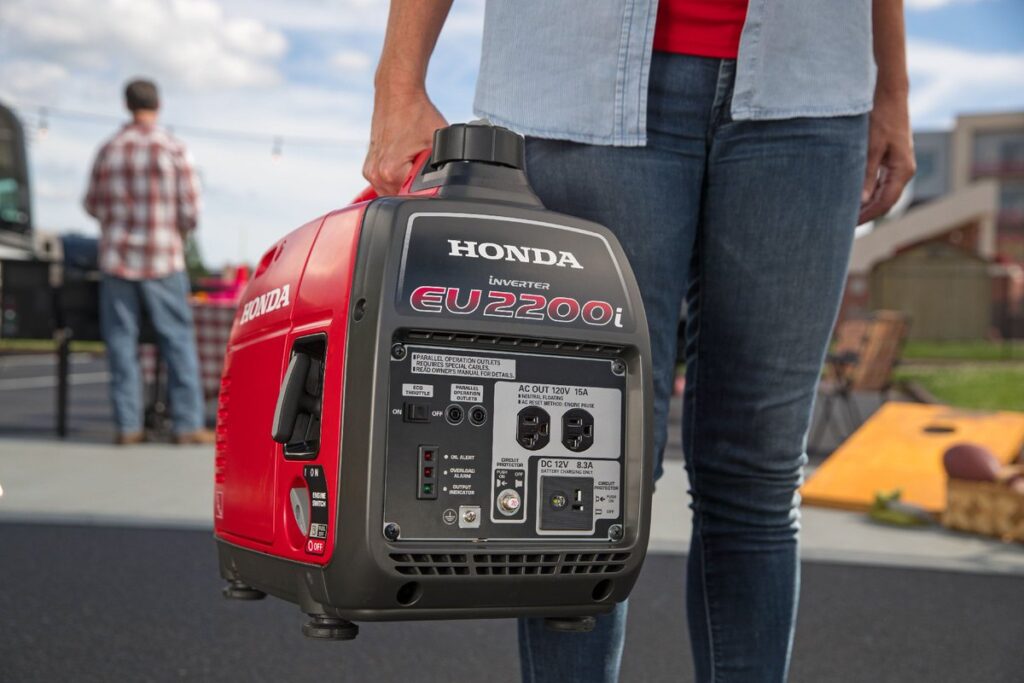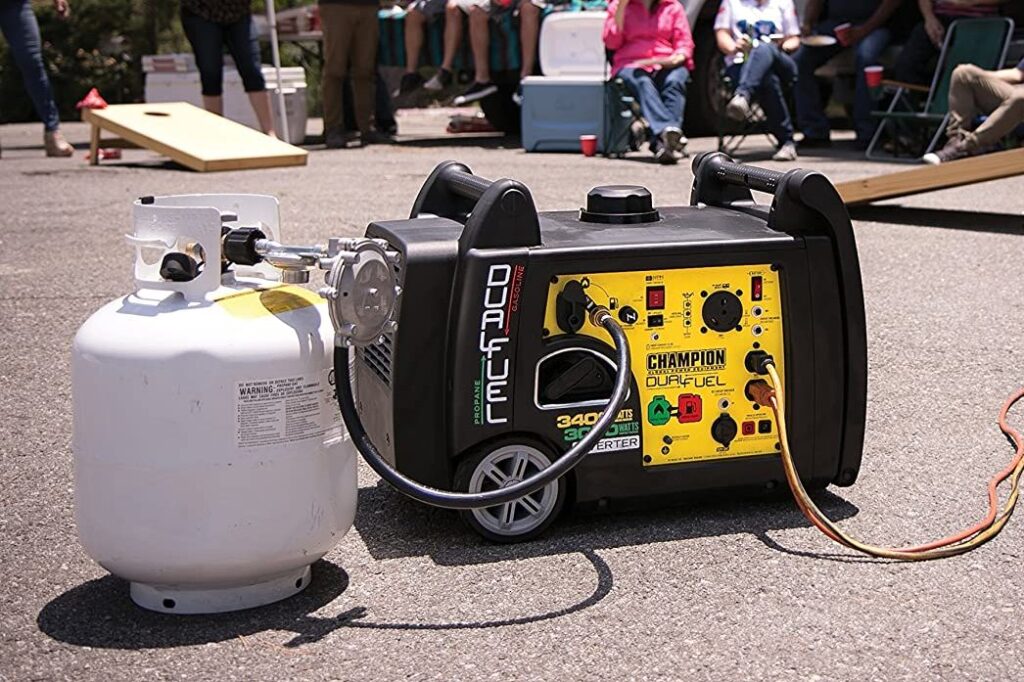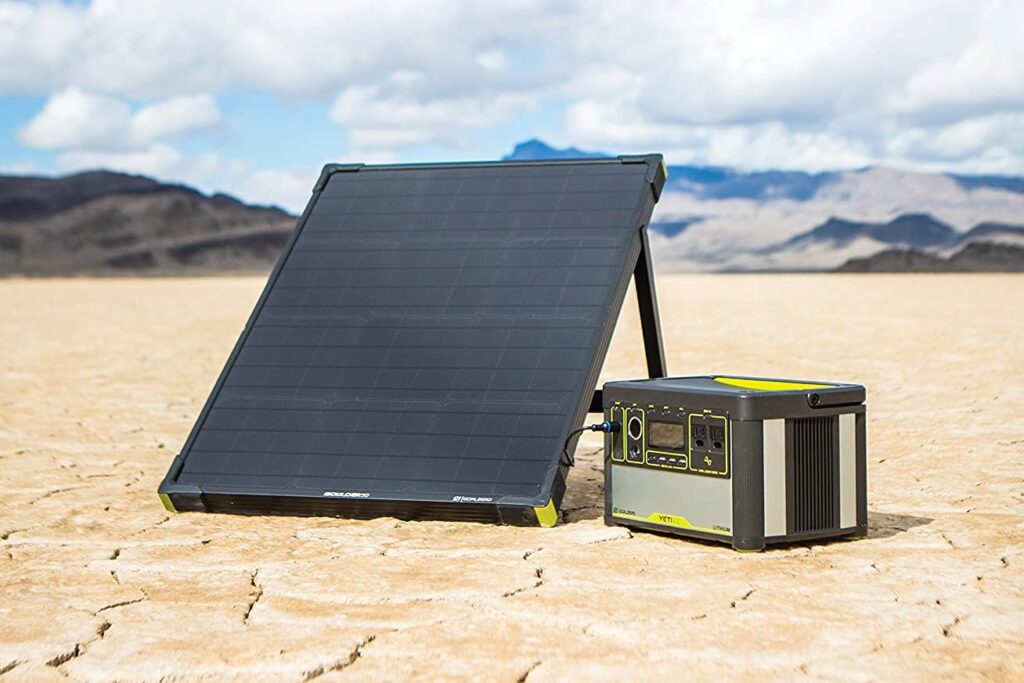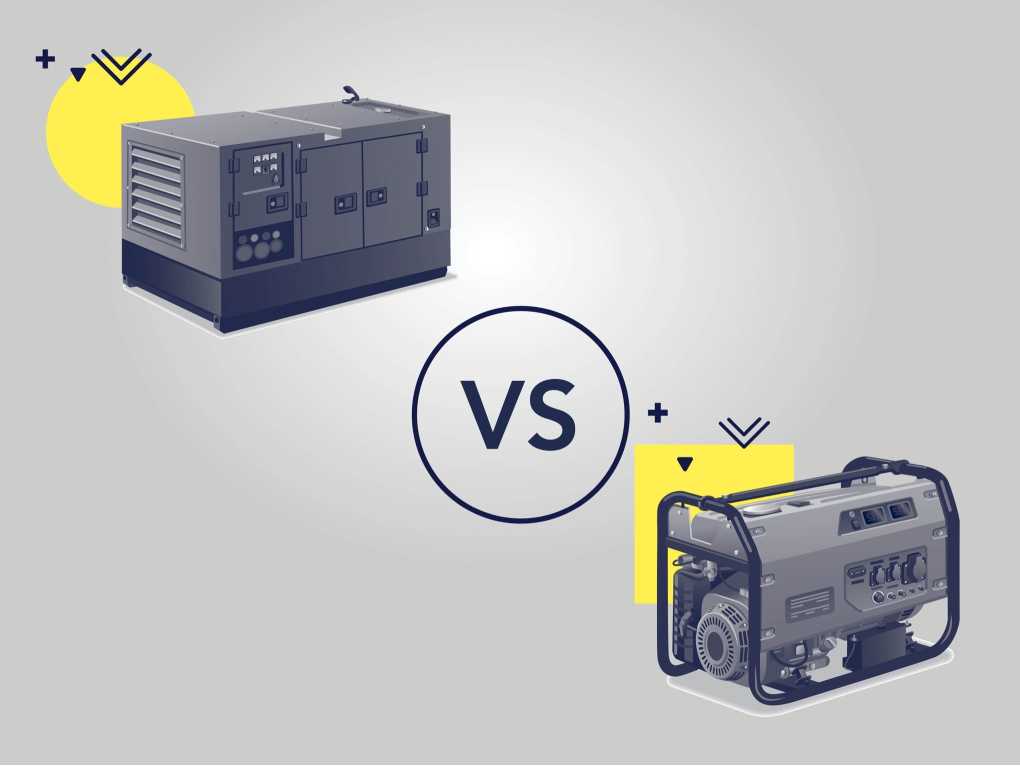Whether you are tailgating at your favorite sporting event, enjoying a weekend away in your RV, or providing power during an emergency, nothing works better than a dual fuel generator, allowing you to use either gasoline or propane. However, choosing the best dual fuel generator can be tricky.
Luckily, we have done the hard work for you and put together a list of the 8 best dual fuel generators, with the Westinghouse WGen7500DF being our top pick. We’ve included inverter generators that are quiet, portable, and will be particularly useful for those who want to bring them camping. We’ve also included some more conventional units that are still portable but will be better suited for powering appliances in an emergency situation. There are generators with at least three outlets, and those with as many as eight, giving you the flexibility to power what you need.
More features: 13 HP, push button and remote start, overload prevention, and low-oil shutoff, EPA, CSA, CARB compliant
Users rave about this powerful dual fuel generator from Westinghouse, and with good reason. The power output may not compete with some of the most powerful generators in our roundup, but 7,500 W of continuous power on gasoline is more than enough power to keep your home running during an emergency and still have wattage leftover. The runtime is also solid, at around 8 hours at half load on either gasoline or propane.
The generator includes many user-friendly features, such as a push-to-start electric ignition like that found in modern cars and even a remote start key fob. The face of the generator includes an easy to read digital runtime meter to alert you to fuel levels. The five included 120 V power outlets provide plenty of space to plug in appliances, and there are even two USB ports for charging small electronics – although these are unlikely to get much use when the generator is outside. The biggest downside to this generator is that, at 74 dB, it is rather noisy.
More features: CARB-compliant, included propane hose, automatic low-oil shut-off, 3-in-1 digital meter, automatic voltage regulation
There are so many things that make this one of the best generators that you can buy right now. First of all, the design is impressive and very functional. It comes fitted with a good handle and wheels that can move other different types of surfaces with ease. This combination results in a portable generator that you can move from place to place.
Under the hood is one of the best engines at this price. Here you find a 457cc engine that produces up to 12000 peak watts and 9500 running watts.
Interestingly this is a dual-fuel generator. Therefore, you can use it with propane and gasoline. When powered by propane, it gives you 10800 peak watts and 8550 running watts. Either way, you have a generator that can power all the appliances that you have in the home.
The generator is also fitted with up to seven outlets, each of these gives you enough channels to connect the devices that you want. There is a 8 gallon tank, which implies an excellent runtime. With this model, you will enjoy up to 12 hours of runtime. This is the best runtime out of all the options that we have reviewed.
Other features that you will enjoy are the safety features. You get low-oil shutoff and a voltage regulator as well.
More features: Intelligauge, built-in surge protector, low oil shut-off sensor; recoil/electric start; variable engine speed; EPA certified and CARB compliant
This massively powerful generator from Champion has a maximum output power of 10,000 W when using gasoline. The generator runs significantly more efficiently on gasoline, meaning that you’ll likely want to opt for the more expensive fuel whenever running this generator. The downside to all of this power is that the runtimes are relatively low – only eight hours at ¼ power on gasoline, and an even more paltry five hours on propane. Thus, this generator is best for events or work sites where you’re powering a lot of high-wattage gear for a relatively short period of time. Importantly, the generator is CARB compliant so that it can be used in most work environments without regulatory issues. Note that Champion also offers less powerful generators, and you can find them in our Champion dual fuel generator reviews.
There are several welcome use features on this generator. The Intelligauge display lets you easily monitor output power and fuel levels to keep track of how the generator is doing. The generator includes numerous outlets, including a 240V outlet, and features a built-in surge protector for safety.
More features: 18 HP, Voltage Selector switch (120V/240V), low Oil Protection, AC and DC Regulators, Spark Arrestor, electric start, full EPA and CARB compliance
This generator from DuroMax is as powerful as it gets, and its 12,000 W of surge power can come in very handy if you are planning to operate motor-driven appliances or tools while simultaneously powering things like field lights or your entire household’s worth of appliances. Unfortunately, DuroMax does not advertise the continuous or surge wattage for running this unit on propane, although users have found that it is still plenty of power for powering a full household. Both gasoline and propane offer around eight hours of continuous runtime, although a larger propane tank can be used to offer longer runtimes.
At 72 dB, this generator is surprisingly not among the loudest on the market despite its impressive power output. It features a voltage selector, electric start motor, and a wide array of power outlets so that you can power almost any appliance seamlessly. The only downside is that the voltage display is analog, which can be difficult to read and monitor. The generator is fully EPA and CARB certified.
More features: 7 HP, voltage selector switch (120V/240V), low oil protection, surge arrest, quiet muffler for noise reduction
If you need a generator that won’t break the bank, this moderately powerful generator from DuroMax is a solid option. The generator outputs 3,500 W continuously when running on gasoline and up to 2,800 W on propane, which is not enough for most houses but is plenty of power for an RV setup. At 10-hour runtimes at half-power on both fuel sources, the generator offers the ability to run it throughout most of the day.
One of the downsides to this generator is that it is relatively noisy, at 69 dB, and heavy, at 132 pounds, for the amount of power it puts out. In addition, note that the generator is not CARB certified and thus cannot legally be operated in California. The voltage is displayed with an analog needle, which can make it somewhat difficult to tell how much power your appliances are sucking from the unit and how much runtime you are actually going to get. The two 120V, 20A outlets can be supplemented with a power strip to provide additional outlets, and the twist-lock outlet is rated for up to 240V for larger appliances.
More features: 120V, 60Hz, traditional inverter, recoil start, 79 cc 4-stroke engine, low oil shut-off
This is one of the best reliable power back up solutions you can invest in. The Champion dual fuel generator offers clean power with its 2 covered household outlets. You can also double your power outlet by purchasing a parallel kit that allows you to connect this inverter with another 2500-watt champion inverter.
The generator comes fully-assembled, so you’ll have a hassle-free setup. Moving it from one place to another is a cinch thanks to the built-in handle and its lightweight design.
Since it produces clean power, you can confidently connect all of your sensitive electronics when using the generator.
The generator uses gasoline or propane. With a half load of gasoline, you will enjoy power for as long as 12 hours while with an equal amount of propane, you will get up to 34 hours. Unlike most generators, it is incredibly quiet, running at a mere 53dBA, which is the same amount of noise produced by a dishwasher. This makes it a perfect option for outdoor use; when you go camping, backpacking or live in a van.
Plus, it comes with 2 handy USB ports that you can use to charge your phone, tablet or laptop.
Also, it is designed with your safety in mind. It shuts off automatically when it senses low oil capacity.
Another interesting feature is the smart economy mode that reduces the electrical load.
More features: 7 HP, recoil start, fuel gauge, EPA approved
The smaller cousin of Sportsman’s GEN7500DF, this model has many of the same design features at a lower cost and running power output of 3,500 W on either gasoline or propane. The runtime on gasoline is not significantly increased despite the cut in power as a result of a smaller gas reservoir, although the increase in runtime on the same canister of propane is significant – up to 12 hours from 5 on the larger model. Unsurprisingly, the generator is also significantly quieter, at around 69 dB, than the larger model.
One of the main design flaws on this generator is the lack of wheels. Even if you are not planning to move the generator frequently, at 90 pounds it is extremely inconvenient to budge it at all without wheels and makes it nearly impossible to use with an RV – despite the included RV outlet. That said, the generator offers plenty of power outlet options and a 12V DC outlet for charging a battery.
More features: clean electricity, low oil shut-off sensor; recoil/electric start; variable engine speed; EPA certified and CARB compliant
Although this Champion dual fuel generator doesn’t offer the output wattage of many of the other generators in our roundup, the inverter generator mechanics make this model stand apart. It is significantly smaller and lighter than conventional generators and comes with wheels to help you move it around, making it ideal for those who need a generator that can move between an RV and campsites frequently, for example. The generator also runs at 59 dB, almost 20 dB quieter than conventional generators.
The power output of this generator, at around 3,000 watts, does not offer enough power to keep your home running but is perfect for an RV. The fact that the power changes relatively little between gasoline and propane makes this a truly dual fuel unit and frees you to choose whichever fuel is most convenient. However, it also doesn’t offer much additional wattage for starting motors, which can be problematic if plugging in an air conditioner or mini-fridge. Having only two standard 120 V, 20 A outlets can also be somewhat limiting, although a power strip can solve this issue.
Now that you’ve been introduced to the eight best dual fuel generators currently on the market, how do you choose between them to find the right one for your needs? Our buying guide summarizes some of the important things to consider when choosing a dual fuel generator.
The ability to use both gasoline and propane to power your generator is significant. In addition to simply giving you the freedom to choose between fuels as the price of gasoline and propane fluctuate, the two different fuels have different strengths. Gasoline is readily available from any gas station, which is ideal if you’re using your generator for an RV or other portable setup. Gasoline is also more efficient and works better in lower temperatures than propane. Propane, on the other hand, stores for much longer than gasoline – making it ideal as an emergency backup fuel that you can store around your house for a year or more. Propane is also typically much less expensive than gasoline.
How you intend to use your generator largely determines what specifications you should be looking for when choosing among models. Operating a generator to power your house when the power goes out is very different, both in terms of the output wattage required and the desired runtime, from powering an RV or a campsite. Also consider, for your intended application, for how long you will need to run your generator continuously in the most extreme cases – and how much power you’ll need in these cases.
If you are planning to use your generator to power your whole house in an emergency, you’ll want to find a high-powered generator that produces at least 5,000 W – more if you have a water pump or energy-hungry heating system. On the other hand, a smaller model with a lower power rating, such as a 2000-Watt generator, is more portable, but better used for powering an RV or a campsite. In addition, if you know you will use either gasoline or propane almost exclusively, you may only need to consider how much power the generator outputs on one fuel rather than how well it balances both fuels. Also consider getting a tri-fuel generator if you need even more versatility and power.
Runtime is also important depending on your application. If you are planning to power your house and want things to run close to normally, you’ll need a generator with a long runtime of 10–12 hours at half power. However, if you are operating an RV and only need power for a few short bursts of time, for example in the morning and evening, then runtime may not be a major consideration.
Both conventional and inverter generators output AC power – the same type of power that comes from your wall outlet – although the mechanism differs enough that there are some significant differences in how conventional and inverter generators operate in practice. Inverter generators are typically designed to be more compact and lightweight and far less noisy than conventional generators, which can be an advantage if you are hauling your generator from place to place rather than keeping it in a fixed location or using it in a public campground.
However, this also means that inverter generators typically have smaller fuel reservoirs – and accordingly shorter run times – as well as lower power outputs, even though they tend to be more fuel-efficient than conventional generators. Although most users will not take advantage of this design feature, inverter generators can be run in parallel to increase your power output, while conventional generators limit you to whatever wattage they are rated for.
Gasoline and propane both have their advantages and disadvantages. Gasoline is typically far more expensive than propane, but is easier to get most of the time and burns more efficiently, especially in low temperatures. However, gasoline has a short shelf life compared to propane and can be nearly impossible to get in an emergency – making propane a better choice for emergency preparations. Read our reviews on propane generators, if this seems like an option you’d like to go for.
A dual power fuel generator is an ideal way to generate electricity whenever you’re off the grid, whether on an RV trip or in the midst of a power outage. The flexibility to use either gasoline or propane to power your generator allows you to choose whichever fuel fits your needs given the situation and offers much more versatility than a traditional gasoline generator. Our roundup of the eight best dual fuel generators on the market and our Buying guide make it easy for you to choose the dual fuel generator that is right for your next camping trip, preparing your home for an emergency, or for whatever else you need portable power.
